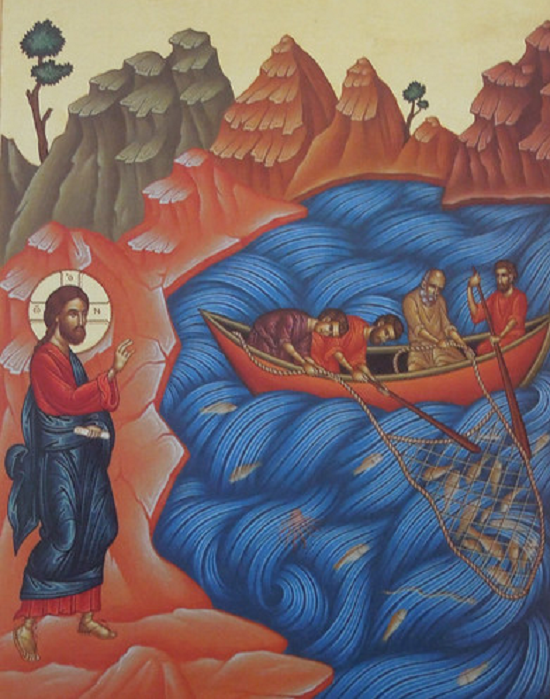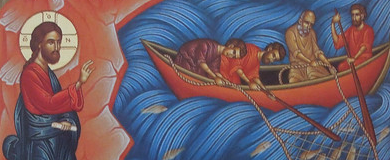Right Where You Are
Scripture Readings

Last Sunday, we heard the conclusion to John’s Gospel, yet here we are with a passage that’s been tacked on to the end of it. It’s unclear why John’s disciples chose to add this passage. It was evidently a part of the eyewitness testimony to the resurrection, and composed to be a part of the gospel, but hadn’t been added to the first twenty chapters. It’s possible that John had died in the meantime and his editorial board didn’t quite know what to do with this left-over fragment. The message this passage conveys is cogent and a fitting epilogue addressed to the Christian community as a whole. Let’s take a closer look at it. The passage is comprised of two related events: Peter’s large catch of fish, and Peter’s redemption and commission. Peter is the evident focal point of the entire passage.
In the first segment, the Lord has been raised from the dead and has appeared to the disciples twice already—both times in the locked room in Jerusalem. Some unspecified time has passed, and the disciples—or at least seven of them—have returned to Galilee. We’ve seen earlier in John’s Gospel that Jesus has already breathed the Holy Spirit upon the apostles at his first appearance, yet here they are back where they started, at least for Peter, James, and John. We might have expected them to be out on the streets of Jerusalem and preaching the good news in the temple precincts as we find the Acts of the Apostles. They were even dragged before the Sanhedrin as we heard in today’s first reading. Instead, we hear Peter telling them, “Let’s go fishing.” When all else fails, go back to what you know.
For all the evangelists, fish represent the people who are attracted to the apostles’ preaching and who will be brought to Jesus. Here we see the apostles working the entire night at what they know to do best, yet without success. In the morning—itself a symbol of resurrection and new life—they see the risen Lord on the shore but don’t recognize him. He suggests they lower their nets once again, and they follow his suggestion with great success. Miraculous or not, it was then that John, the beloved disciple, recognized what had happened as a mighty work such as they had seen Jesus perform often during their three years following him. He recognized Jesus by his powerful works. “By their fruits you shall know them.” At first, Peter didn’t recognize Jesus, but, as soon as he did, he threw himself into the water and swam to the shore to be with him. The other disciples brought their catch of fish to the shore and Jesus fed them with loaves and fishes—for John, a symbol of the eucharist.
So, what is the message in this first part of today’s gospel passage? Most importantly, like the disciples in the boat that night, our work is in vain without the grace of God. Futility is a powerful teacher, and it continues to dog us so long as we’re under the illusion that “we’ve got this.” It’s only when we give up, admit defeat and powerlessness that the grace of God has a chance to work in us and to produce prodigious effects. When we see those effects that exceed our efforts, it’s time to look around for Jesus. At first, we may not recognize him because he never appears the way we expect. But if we look closely, we can discern his hand in whatever good we accomplish. We also learn that, like the apostles, we’ve been called to do great things, but God doesn’t demand more of us than we can deliver. God takes us as we are, where we are, and from our modest life and work he makes wondrous things happen.
Now, on to the second half of today’s gospel passage. Our attention continues to be focused on Peter. Peter threw himself into the water because he didn’t want to be separated from his master for even a moment. In return, Jesus asked Peter three questions, each of which was meant to forgive and heal Peter’s three denials of him. The full impact of this dialog can’t be appreciated without understanding the two Greek words that are being used here for love. The first word is αγαπη (agapē) which is an all-consuming, self-sacrificing love. The second word is φιλια (philia) which is brotherly love—as in Philadelphia—or like-you-a-lot love as in friendship.
So, when Jesus asks Peter the first time, “Simon, son of John do you love me with an all-consuming love [αγαπη]?” Peter replies, “Yes, Lord, you know I like-you-a-lot [φιλια].” Then Jesus asks again, “Simon, son of John do you love me with an all-consuming love [αγαπη]?” And Peter replies a second time, “Yes, Lord, you know I like-you-a-lot [φιλια].” Finally, a third time, Jesus asks “Simon, son of John do you like-me-a-lot [φιλια]?” And Peter was distressed that Jesus had asked him the third time, “Do you like-me-a-lot [φιλια]?” So, Peter responds, “You know everything. You know I like-you-a-lot [φιλια].” Did you see what happened? Twice Jesus set the love bar very high, and twice Peter failed to meet it. The third time, Jesus lowered the bar.
Regardless, Peter is given tremendous responsibility. He’s asked nothing less than to assume Jesus’s role as the Good Shepherd. He’s given charge of the flock of God, the Shepherd of Israel, and all the other sheep that are not yet part of God’s fold. Indeed, the Good Shepherd is the one who lays down his life for the sheep. Thus, immediately, Jesus foretells Peter’s death. The mini parable he tells is quite interesting. “When you were young,” Jesus tells him, “You used to dress yourself.” The word used for dress in Greek means to gird on a belt or tie a rope cincture around your waist. Then Jesus says to Peter, “When you grow old, you will stretch out your hands and someone else will dress you…” The same word for dress is being used. The implication is that Peter will stretch out his hands and have them tied. Stretching out one’s hands and having them tied is a euphemism for crucifixion. Jesus is letting Peter know that his service to God’s people as the Good Shepherd will go the full distance.
The two sections of today’s gospel passage complement and complete one another. Jesus is calling us to heroic virtue and apostolic zeal. He calls and we respond as we are able. The call to heroism continues unabated, even though we’re unable to respond adequately. Yet, God doesn’t reject or punish us for our shortcomings. God accepts whatever it is we’re able to give at that time, so long as we’re willing to continue to try. And though our love can never match the infinite love God has for us, God doesn’t withdraw his call to be his followers and to bring his love into the world in whatever way we’re able. Though we may be weak and fallible, Jesus is always there as though on the seashore, performing powerful works for us and offering us the nourishment and strength of his loaves and fishes—his own body and blood in the Eucharist.
Get articles from H. Les Brown delivered to your email inbox.
